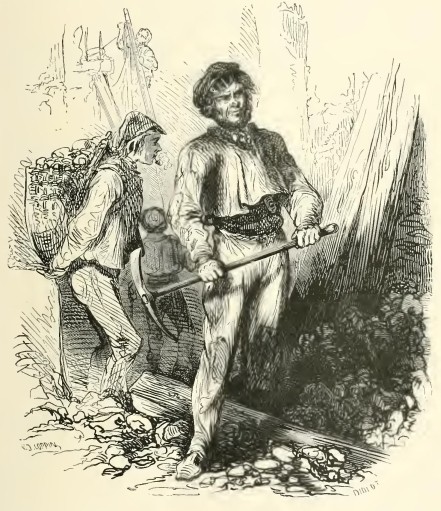


At the moment when d’Avrigny was returning to Valentine’s room, accompanied by Villefort, an Italian priest, of serious demeanor and calm and firm tone, hired for his use the house adjoining the hotel of M. de Villefort. No one knew how the three former tenants of that house left it. About two hours afterwards its foundation was reported to be unsafe; but the report did not prevent the new occupant establishing himself there with his modest furniture the same day at five o’clock. The lease was drawn up for three, six, or nine years by the new tenant, who, according to the rule of the proprietor, paid six months in advance.
This new tenant, who, as we have said, was an Italian, was called Il Signor Giacomo Busoni. Workmen were immediately called in, and that same night the passengers at the end of the faubourg saw with surprise that carpenters and masons were occupied in repairing the lower part of the tottering house.
We saw in a preceding chapter how Madame Danglars went formally to announce to Madame de Villefort the approaching marriage of Eugénie Danglars and M. Andrea Cavalcanti. This formal announcement, which implied or appeared to imply, the approval of all the persons concerned in this momentous affair, had been preceded by a scene to which our readers must be admitted. We beg them to take one step backward, and to transport themselves, the morning of that day of great catastrophes, into the showy, gilded salon we have before shown them, and which was the pride of its owner, Baron Danglars.
In this room, at about ten o’clock in the morning, the banker himself had been walking to and fro for some minutes thoughtfully and in evident uneasiness, watching both doors, and listening to every sound. When his patience was exhausted, he called his valet.
“Étienne,” said he, “see why Mademoiselle Eugénie has asked me to meet her in the drawing-room, and why she makes me wait so long.”
Having given this vent to his ill-humor, the baron became more calm; Mademoiselle Danglars had that morning requested an interview with her father, and had fixed on the gilded drawing-room as the spot. The singularity of this step, and above all its formality, had not a little surprised the banker, who had immediately obeyed his daughter by repairing first to the drawing-room. Étienne soon returned from his errand.
“Mademoiselle’s lady’s maid says, sir, that mademoiselle is finishing her toilette, and will be here shortly.”
Danglars nodded, to signify that he was satisfied. To the world and to his servants Danglars assumed the character of the good-natured man and the indulgent father. This was one of his parts in the popular comedy he was performing,—a make-up he had adopted and which suited him about as well as the masks worn on the classic stage by paternal actors, who seen from one side, were the image of geniality, and from the other showed lips drawn down in chronic ill-temper. Let us hasten to say that in private the genial side descended to the level of the other, so that generally the indulgent man disappeared to give place to the brutal husband and domineering father.
“Why the devil does that foolish girl, who pretends to wish to speak to me, not come into my study? and why on earth does she want to speak to me at all?”
He was turning this thought over in his brain for the twentieth time, when the door opened and Eugénie appeared, attired in a figured black satin dress, her hair dressed and gloves on, as if she were going to the Italian Opera.
“Well, Eugénie, what is it you want with me? and why in this solemn drawing-room when the study is so comfortable?”
“I quite understand why you ask, sir,” said Eugénie, making a sign that her father might be seated, “and in fact your two questions suggest fully the theme of our conversation. I will answer them both, and contrary to the usual method, the last first, because it is the least difficult. I have chosen the drawing-room, sir, as our place of meeting, in order to avoid the disagreeable impressions and influences of a banker’s study. Those gilded cashbooks, drawers locked like gates of fortresses, heaps of bank-bills, come from I know not where, and the quantities of letters from England, Holland, Spain, India, China, and Peru, have generally a strange influence on a father’s mind, and make him forget that there is in the world an interest greater and more sacred than the good opinion of his correspondents. I have, therefore, chosen this drawing-room, where you see, smiling and happy in their magnificent frames, your portrait, mine, my mother’s, and all sorts of rural landscapes and touching pastorals. I rely much on external impressions; perhaps, with regard to you, they are immaterial, but I should be no artist if I had not some fancies.”
“Very well,” replied M. Danglars, who had listened to all this preamble with imperturbable coolness, but without understanding a word, since like every man burdened with thoughts of the past, he was occupied with seeking the thread of his own ideas in those of the speaker.
“There is, then, the second point cleared up, or nearly so,” said Eugénie, without the least confusion, and with that masculine pointedness which distinguished her gesture and her language; “and you appear satisfied with the explanation. Now, let us return to the first. You ask me why I have requested this interview; I will tell you in two words, sir; I will not marry count Andrea Cavalcanti.”
Danglars leaped from his chair and raised his eyes and arms towards heaven.
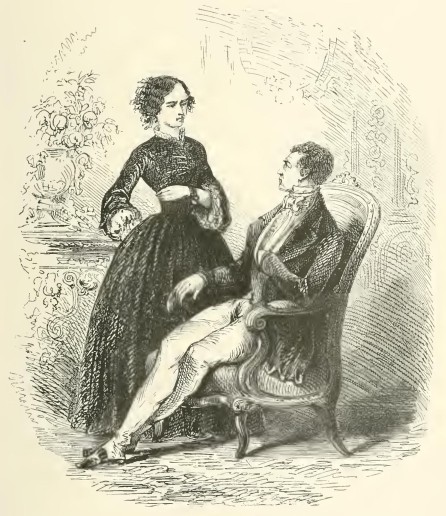

“Yes, indeed, sir,” continued Eugénie, still quite calm; “you are astonished, I see; for since this little affair began, I have not manifested the slightest opposition, and yet I am always sure, when the opportunity arrives, to oppose a determined and absolute will to people who have not consulted me, and things which displease me. However, this time, my tranquillity, or passiveness as philosophers say, proceeded from another source; it proceeded from a wish, like a submissive and devoted daughter” (a slight smile was observable on the purple lips of the young girl), “to practice obedience.”
“Well?” asked Danglars.
“Well, sir,” replied Eugénie, “I have tried to the very last and now that the moment has come, I feel in spite of all my efforts that it is impossible.”
“But,” said Danglars, whose weak mind was at first quite overwhelmed with the weight of this pitiless logic, marking evident premeditation and force of will, “what is your reason for this refusal, Eugénie? what reason do you assign?”
“My reason?” replied the young girl. “Well, it is not that the man is more ugly, more foolish, or more disagreeable than any other; no, M. Andrea Cavalcanti may appear to those who look at men’s faces and figures as a very good specimen of his kind. It is not, either, that my heart is less touched by him than any other; that would be a schoolgirl’s reason, which I consider quite beneath me. I actually love no one, sir; you know it, do you not? I do not then see why, without real necessity, I should encumber my life with a perpetual companion. Has not some sage said, ‘Nothing too much’? and another, ‘I carry all my effects with me’? I have been taught these two aphorisms in Latin and in Greek; one is, I believe, from Phædrus, and the other from Bias. Well, my dear father, in the shipwreck of life—for life is an eternal shipwreck of our hopes—I cast into the sea my useless encumbrance, that is all, and I remain with my own will, disposed to live perfectly alone, and consequently perfectly free.”
“Unhappy girl, unhappy girl!” murmured Danglars, turning pale, for he knew from long experience the solidity of the obstacle he had so suddenly encountered.
“Unhappy girl,” replied Eugénie, “unhappy girl, do you say, sir? No, indeed; the exclamation appears quite theatrical and affected. Happy, on the contrary, for what am I in want of? The world calls me beautiful. It is something to be well received. I like a favorable reception; it expands the countenance, and those around me do not then appear so ugly. I possess a share of wit, and a certain relative sensibility, which enables me to draw from life in general, for the support of mine, all I meet with that is good, like the monkey who cracks the nut to get at its contents. I am rich, for you have one of the first fortunes in France. I am your only daughter, and you are not so exacting as the fathers of the Porte Saint-Martin and Gaîté, who disinherit their daughters for not giving them grandchildren. Besides, the provident law has deprived you of the power to disinherit me, at least entirely, as it has also of the power to compel me to marry Monsieur This or Monsieur That. And so—being, beautiful, witty, somewhat talented, as the comic operas say, and rich—and that is happiness, sir—why do you call me unhappy?”
Danglars, seeing his daughter smiling, and proud even to insolence, could not entirely repress his brutal feelings, but they betrayed themselves only by an exclamation. Under the fixed and inquiring gaze levelled at him from under those beautiful black eyebrows, he prudently turned away, and calmed himself immediately, daunted by the power of a resolute mind.
“Truly, my daughter,” replied he with a smile, “you are all you boast of being, excepting one thing; I will not too hastily tell you which, but would rather leave you to guess it.”
Eugénie looked at Danglars, much surprised that one flower of her crown of pride, with which she had so superbly decked herself, should be disputed.
“My daughter,” continued the banker, “you have perfectly explained to me the sentiments which influence a girl like you, who is determined she will not marry; now it remains for me to tell you the motives of a father like me, who has decided that his daughter shall marry.”
Eugénie bowed, not as a submissive daughter, but as an adversary prepared for a discussion.
“My daughter,” continued Danglars, “when a father asks his daughter to choose a husband, he has always some reason for wishing her to marry. Some are affected with the mania of which you spoke just now, that of living again in their grandchildren. This is not my weakness, I tell you at once; family joys have no charm for me. I may acknowledge this to a daughter whom I know to be philosophical enough to understand my indifference, and not to impute it to me as a crime.”
“This is not to the purpose,” said Eugénie; “let us speak candidly, sir; I admire candor.”
“Oh,” said Danglars, “I can, when circumstances render it desirable, adopt your system, although it may not be my general practice. I will therefore proceed. I have proposed to you to marry, not for your sake, for indeed I did not think of you in the least at the moment (you admire candor, and will now be satisfied, I hope); but because it suited me to marry you as soon as possible, on account of certain commercial speculations I am desirous of entering into.” Eugénie became uneasy.
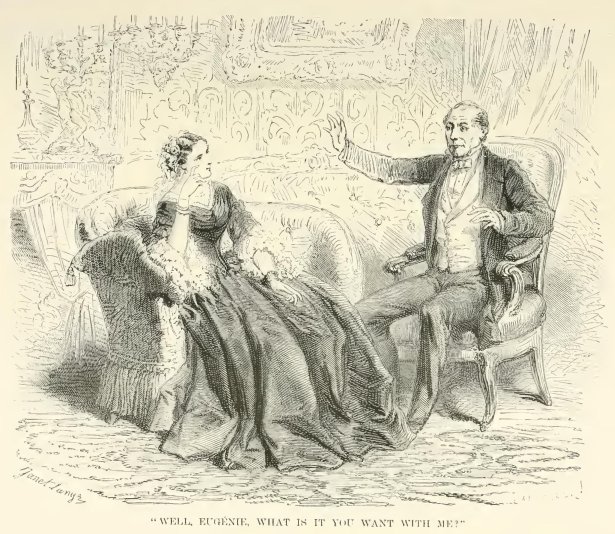

“It is just as I tell you, I assure you, and you must not be angry with me, for you have sought this disclosure. I do not willingly enter into arithmetical explanations with an artist like you, who fears to enter my study lest she should imbibe disagreeable or anti-poetic impressions and sensations. But in that same banker’s study, where you very willingly presented yourself yesterday to ask for the thousand francs I give you monthly for pocket-money, you must know, my dear young lady, that many things may be learned, useful even to a girl who will not marry. There one may learn, for instance, what, out of regard to your nervous susceptibility, I will inform you of in the drawing-room, namely, that the credit of a banker is his physical and moral life; that credit sustains him as breath animates the body; and M. de Monte Cristo once gave me a lecture on that subject, which I have never forgotten. There we may learn that as credit sinks, the body becomes a corpse, and this is what must happen very soon to the banker who is proud to own so good a logician as you for his daughter.”
But Eugénie, instead of stooping, drew herself up under the blow. “Ruined?” said she.
“Exactly, my daughter; that is precisely what I mean,” said Danglars, almost digging his nails into his breast, while he preserved on his harsh features the smile of the heartless though clever man; “ruined—yes, that is it.”
“Ah!” said Eugénie.
“Yes, ruined! Now it is revealed, this secret so full of horror, as the tragic poet says. Now, my daughter, learn from my lips how you may alleviate this misfortune, so far as it will affect you.”
“Oh,” cried Eugénie, “you are a bad physiognomist, if you imagine I deplore on my own account the catastrophe of which you warn me. I ruined? and what will that signify to me? Have I not my talent left? Can I not, like Pasta, Malibran, Grisi, acquire for myself what you would never have given me, whatever might have been your fortune, a hundred or a hundred and fifty thousand livres per annum, for which I shall be indebted to no one but myself; and which, instead of being given as you gave me those poor twelve thousand francs, with sour looks and reproaches for my prodigality, will be accompanied with acclamations, with bravos, and with flowers? And if I do not possess that talent, which your smiles prove to me you doubt, should I not still have that ardent love of independence, which will be a substitute for wealth, and which in my mind supersedes even the instinct of self-preservation? No, I grieve not on my own account, I shall always find a resource; my books, my pencils, my piano, all the things which cost but little, and which I shall be able to procure, will remain my own.
“Do you think that I sorrow for Madame Danglars? Undeceive yourself again; either I am greatly mistaken, or she has provided against the catastrophe which threatens you, and, which will pass over without affecting her. She has taken care for herself,—at least I hope so,—for her attention has not been diverted from her projects by watching over me. She has fostered my independence by professedly indulging my love for liberty. Oh, no, sir; from my childhood I have seen too much, and understood too much, of what has passed around me, for misfortune to have an undue power over me. From my earliest recollections, I have been beloved by no one—so much the worse; that has naturally led me to love no one—so much the better—now you have my profession of faith.”
“Then,” said Danglars, pale with anger, which was not at all due to offended paternal love,—“then, mademoiselle, you persist in your determination to accelerate my ruin?”
“Your ruin? I accelerate your ruin? What do you mean? I do not understand you.”
“So much the better, I have a ray of hope left; listen.”
“I am all attention,” said Eugénie, looking so earnestly at her father that it was an effort for the latter to endure her unrelenting gaze.
“M. Cavalcanti,” continued Danglars, “is about to marry you, and will place in my hands his fortune, amounting to three million livres.”
“That is admirable!” said Eugénie with sovereign contempt, smoothing her gloves out one upon the other.
“You think I shall deprive you of those three millions,” said Danglars; “but do not fear it. They are destined to produce at least ten. I and a brother banker have obtained a grant of a railway, the only industrial enterprise which in these days promises to make good the fabulous prospects that Law once held out to the eternally deluded Parisians, in the fantastic Mississippi scheme. As I look at it, a millionth part of a railway is worth fully as much as an acre of waste land on the banks of the Ohio. We make in our case a deposit, on a mortgage, which is an advance, as you see, since we gain at least ten, fifteen, twenty, or a hundred livres’ worth of iron in exchange for our money. Well, within a week I am to deposit four millions for my share; the four millions, I promise you, will produce ten or twelve.”
“But during my visit to you the day before yesterday, sir, which you appear to recollect so well,” replied Eugénie, “I saw you arranging a deposit—is not that the term?—of five millions and a half; you even pointed it out to me in two drafts on the treasury, and you were astonished that so valuable a paper did not dazzle my eyes like lightning.”
“Yes, but those five millions and a half are not mine, and are only a proof of the great confidence placed in me; my title of popular banker has gained me the confidence of charitable institutions, and the five millions and a half belong to them; at any other time I should not have hesitated to make use of them, but the great losses I have recently sustained are well known, and, as I told you, my credit is rather shaken. That deposit may be at any moment withdrawn, and if I had employed it for another purpose, I should bring on me a disgraceful bankruptcy. I do not despise bankruptcies, believe me, but they must be those which enrich, not those which ruin. Now, if you marry M. Cavalcanti, and I get the three millions, or even if it is thought I am going to get them, my credit will be restored, and my fortune, which for the last month or two has been swallowed up in gulfs which have been opened in my path by an inconceivable fatality, will revive. Do you understand me?”
“Perfectly; you pledge me for three millions, do you not?”
“The greater the amount, the more flattering it is to you; it gives you an idea of your value.”
“Thank you. One word more, sir; do you promise me to make what use you can of the report of the fortune M. Cavalcanti will bring without touching the money? This is no act of selfishness, but of delicacy. I am willing to help rebuild your fortune, but I will not be an accomplice in the ruin of others.”
“But since I tell you,” cried Danglars, “that with these three million——”
“Do you expect to recover your position, sir, without touching those three million?”
“I hope so, if the marriage should take place and confirm my credit.”
“Shall you be able to pay M. Cavalcanti the five hundred thousand francs you promise for my dowry?”
“He shall receive them on returning from the mayor’s20.”
“Very well!”
“What next? what more do you want?”
“I wish to know if, in demanding my signature, you leave me entirely free in my person?”
“Absolutely.”
“Then, as I said before, sir,—very well; I am ready to marry M. Cavalcanti.”
“But what are you up to?”
“Ah, that is my affair. What advantage should I have over you, if knowing your secret I were to tell you mine?”
Danglars bit his lips. “Then,” said he, “you are ready to pay the official visits, which are absolutely indispensable?”
“Yes,” replied Eugénie.
“And to sign the contract in three days?”
“Yes.”
“Then, in my turn, I also say, very well!”
Danglars pressed his daughter’s hand in his. But, extraordinary to relate, the father did not say, “Thank you, my child,” nor did the daughter smile at her father.
“Is the conference ended?” asked Eugénie, rising.
Danglars motioned that he had nothing more to say. Five minutes afterwards the piano resounded to the touch of Mademoiselle d’Armilly’s fingers, and Mademoiselle Danglars was singing Brabantio’s malediction on Desdemona. At the end of the piece Étienne entered, and announced to Eugénie that the horses were to the carriage, and that the baroness was waiting for her to pay her visits. We have seen them at Villefort’s; they proceeded then on their course.
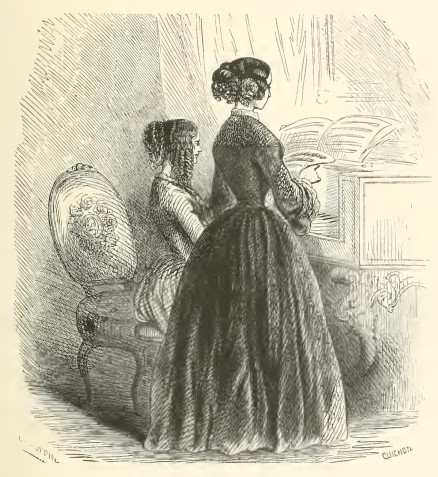

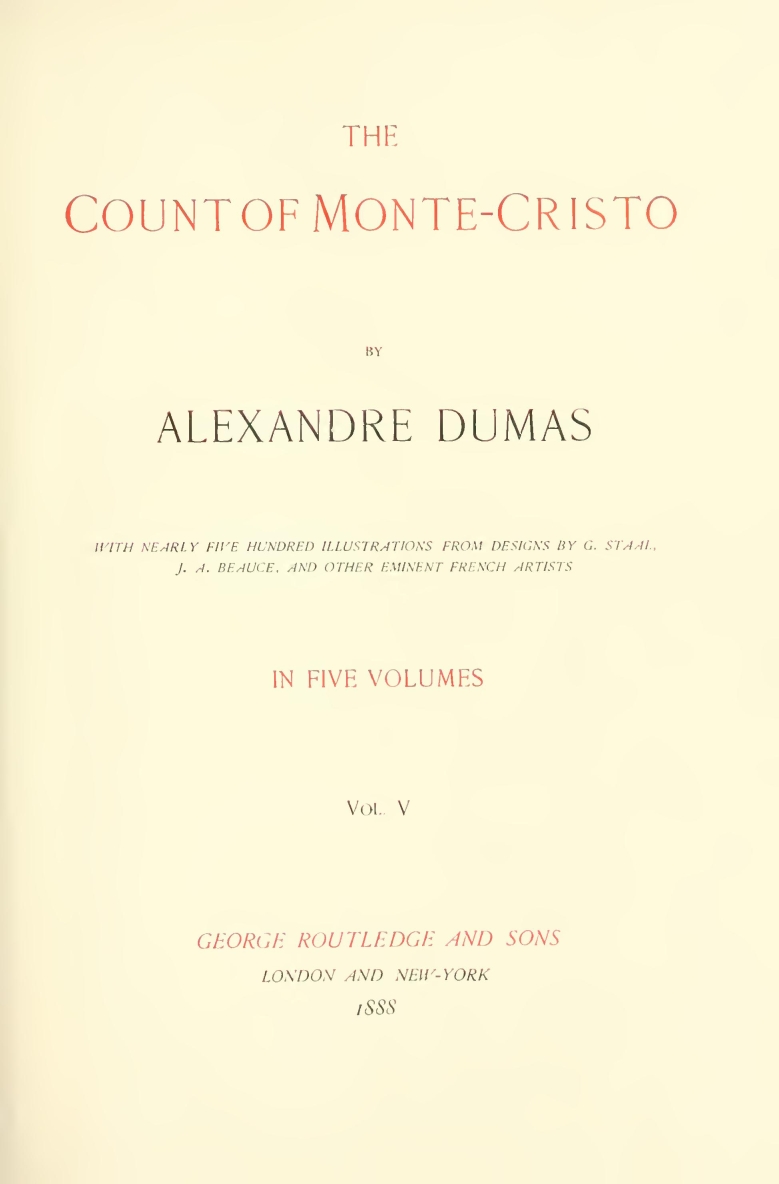

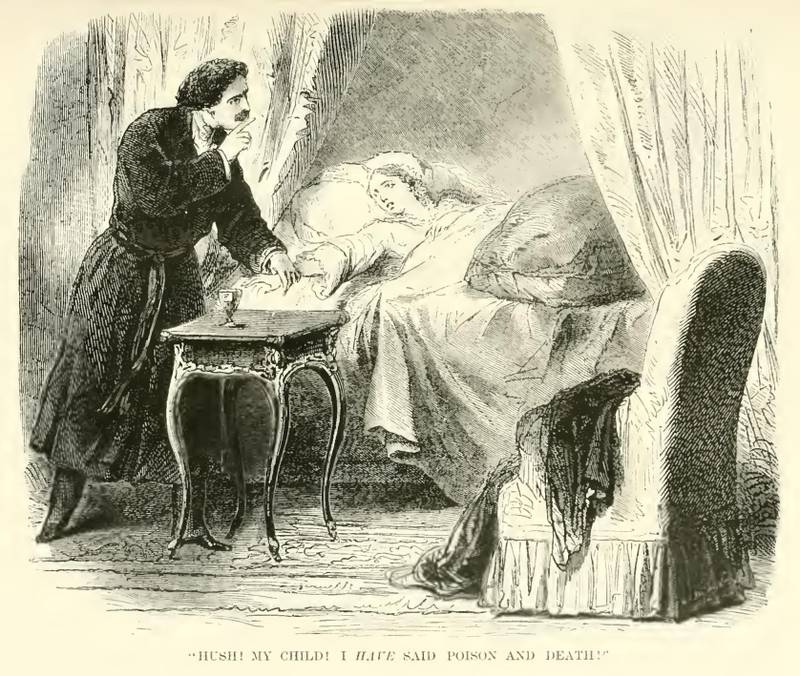

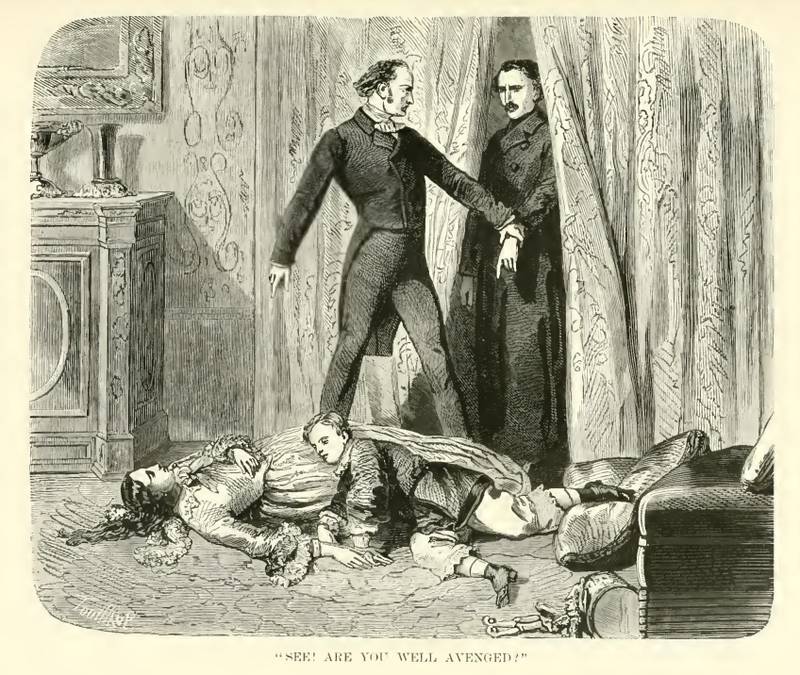

Three days after the scene we have just described, namely towards five o’clock in the afternoon of the day fixed for the signature of the contract between Mademoiselle Eugénie Danglars and Andrea Cavalcanti, whom the banker persisted in calling prince, a fresh breeze was stirring the leaves in the little garden in front of the Count of Monte Cristo’s house, and the count was preparing to go out. While his horses were impatiently pawing the ground, held in by the coachman, who had been seated a quarter of an hour on his box, the elegant phaeton with which we are familiar rapidly turned the angle of the entrance-gate, and cast out on the doorsteps M. Andrea Cavalcanti, as decked up and gay as if he were going to marry a princess.
He inquired after the count with his usual familiarity, and ascending lightly to the first story met him at the top of the stairs.
The count stopped on seeing the young man. As for Andrea, he was launched, and when he was once launched nothing stopped him.
“Ah, good morning, my dear count,” said he.
“Ah, M. Andrea,” said the latter, with his half-jesting tone; “how do you do?”
“Charmingly, as you see. I am come to talk to you about a thousand things; but, first tell me, were you going out or just returned?”
“I was going out, sir.”
“Then, in order not to hinder you, I will get up with you if you please in your carriage, and Tom shall follow with my phaeton in tow.”
“No,” said the count, with an imperceptible smile of contempt, for he had no wish to be seen in the young man’s society,—“no; I prefer listening to you here, my dear M. Andrea; we can chat better in-doors, and there is no coachman to overhear our conversation.”
The count returned to a small drawing-room on the first floor, sat down, and crossing his legs motioned to the young man to take a seat also. Andrea assumed his gayest manner.
“You know, my dear count,” said he, “the ceremony is to take place this evening. At nine o’clock the contract is to be signed at my father-in-law’s.”
“Ah, indeed?” said Monte Cristo.
“What; is it news to you? Has not M. Danglars informed you of the ceremony?”
“Oh, yes,” said the count; “I received a letter from him yesterday, but I do not think the hour was mentioned.”
“Possibly my father-in-law trusted to its general notoriety.”
“Well,” said Monte Cristo, “you are fortunate, M. Cavalcanti; it is a most suitable alliance you are contracting, and Mademoiselle Danglars is a handsome girl.”
“Yes, indeed she is,” replied Cavalcanti, in a very modest tone.
“Above all, she is very rich,—at least, I believe so,” said Monte Cristo.
“Very rich, do you think?” replied the young man.
“Doubtless; it is said M. Danglars conceals at least half of his fortune.”
“And he acknowledges fifteen or twenty millions,” said Andrea with a look sparkling with joy.
“Without reckoning,” added Monte Cristo, “that he is on the eve of entering into a sort of speculation already in vogue in the United States and in England, but quite novel in France.”
“Yes, yes, I know what you mean,—the railway, of which he has obtained the grant, is it not?”
“Precisely; it is generally believed he will gain ten millions by that affair.”
“Ten millions! Do you think so? It is magnificent!” said Cavalcanti, who was quite confounded at the metallic sound of these golden words.
“Without reckoning,” replied Monte Cristo, “that all his fortune will come to you, and justly too, since Mademoiselle Danglars is an only daughter. Besides, your own fortune, as your father assured me, is almost equal to that of your betrothed. But enough of money matters. Do you know, M. Andrea, I think you have managed this affair rather skilfully?”
“Not badly, by any means,” said the young man; “I was born for a diplomatist.”
“Well, you must become a diplomatist; diplomacy, you know, is something that is not to be acquired; it is instinctive. Have you lost your heart?”
“Indeed, I fear it,” replied Andrea, in the tone in which he had heard Dorante or Valère reply to Alceste21 at the Théâtre Français.
“Is your love returned?”
“I suppose so,” said Andrea with a triumphant smile, “since I am accepted. But I must not forget one grand point.”
“Which?”
“That I have been singularly assisted.”
“Nonsense.”
“I have, indeed.”
“By circumstances?”
“No; by you.”
“By me? Not at all, prince,” said Monte Cristo laying a marked stress on the title, “what have I done for you? Are not your name, your social position, and your merit sufficient?”
“No,” said Andrea,—“no; it is useless for you to say so, count. I maintain that the position of a man like you has done more than my name, my social position, and my merit.”
“You are completely mistaken, sir,” said Monte Cristo coldly, who felt the perfidious manœuvre of the young man, and understood the bearing of his words; “you only acquired my protection after the influence and fortune of your father had been ascertained; for, after all, who procured for me, who had never seen either you or your illustrious father, the pleasure of your acquaintance?—two of my good friends, Lord Wilmore and the Abbé Busoni. What encouraged me not to become your surety, but to patronize you?—your father’s name, so well known in Italy and so highly honored. Personally, I do not know you.”
This calm tone and perfect ease made Andrea feel that he was, for the moment, restrained by a more muscular hand than his own, and that the restraint could not be easily broken through.
“Oh, then my father has really a very large fortune, count?”
“It appears so, sir,” replied Monte Cristo.
“Do you know if the marriage settlement he promised me has come?”
“I have been advised of it.”
“But the three millions?”
“The three millions are probably on the road.”
“Then I shall really have them?”
“Oh, well,” said the count, “I do not think you have yet known the want of money.”
Andrea was so surprised that he pondered the matter for a moment. Then, arousing from his reverie:
“Now, sir, I have one request to make to you, which you will understand, even if it should be disagreeable to you.”
“Proceed,” said Monte Cristo.
“I have formed an acquaintance, thanks to my good fortune, with many noted persons, and have, at least for the moment, a crowd of friends. But marrying, as I am about to do, before all Paris, I ought to be supported by an illustrious name, and in the absence of the paternal hand some powerful one ought to lead me to the altar; now, my father is not coming to Paris, is he?”
“He is old, covered with wounds, and suffers dreadfully, he says, in travelling.”
“I understand; well, I am come to ask a favor of you.”
“Of me?”
“Yes, of you.”
“And pray what may it be?”
“Well, to take his part.”
“Ah, my dear sir! What?—after the varied relations I have had the happiness to sustain towards you, can it be that you know me so little as to ask such a thing? Ask me to lend you half a million and, although such a loan is somewhat rare, on my honor, you would annoy me less! Know, then, what I thought I had already told you, that in participation in this world’s affairs, more especially in their moral aspects, the Count of Monte Cristo has never ceased to entertain the scruples and even the superstitions of the East. I, who have a seraglio at Cairo, one at Smyrna, and one at Constantinople, preside at a wedding?—never!”
“Then you refuse me?”
“Decidedly; and were you my son or my brother I would refuse you in the same way.”
“But what must be done?” said Andrea, disappointed.
“You said just now that you had a hundred friends.”
“Very true, but you introduced me at M. Danglars’.”
“Not at all! Let us recall the exact facts. You met him at a dinner party at my house, and you introduced yourself at his house; that is a totally different affair.”
“Yes, but, by my marriage, you have forwarded that.”
“I?—not in the least, I beg you to believe. Recollect what I told you when you asked me to propose you. ‘Oh, I never make matches, my dear prince, it is my settled principle.’” Andrea bit his lips.
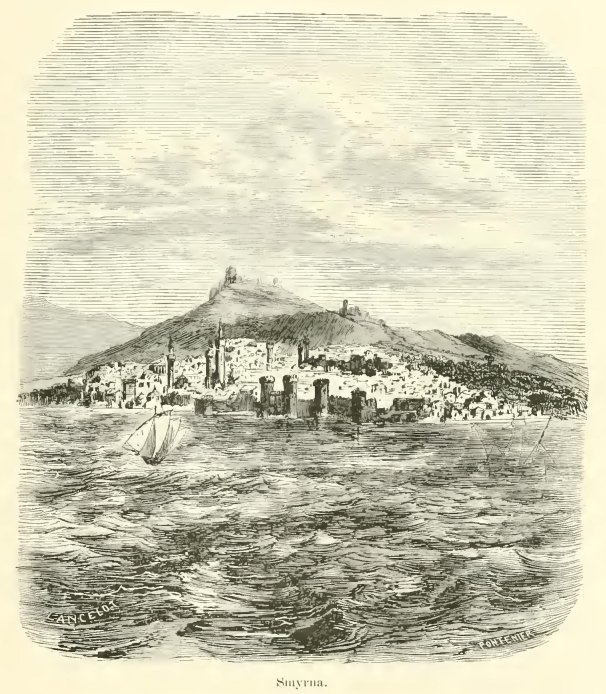

“But, at least, you will be there?”
“Will all Paris be there?”
“Oh, certainly.”
“Well, like all Paris, I shall be there too,” said the count.
“And will you sign the contract?”
“I see no objection to that; my scruples do not go thus far.”
“Well, since you will grant me no more, I must be content with what you give me. But one word more, count.”
“What is it?”
“Advice.”
“Be careful; advice is worse than a service.”
“Oh, you can give me this without compromising yourself.”
“Tell me what it is.”
“Is my wife’s fortune five hundred thousand livres?”
“That is the sum M. Danglars himself announced.”
“Must I receive it, or leave it in the hands of the notary?”
“This is the way such affairs are generally arranged when it is wished to do them stylishly: Your two solicitors appoint a meeting, when the contract is signed, for the next or the following day; then they exchange the two portions, for which they each give a receipt; then, when the marriage is celebrated, they place the amount at your disposal as the chief member of the alliance.”
“Because,” said Andrea, with a certain ill-concealed uneasiness, “I thought I heard my father-in-law say that he intended embarking our property in that famous railway affair of which you spoke just now.”
“Well,” replied Monte Cristo, “it will be the way, everybody says, of trebling your fortune in twelve months. Baron Danglars is a good father, and knows how to calculate.”
“In that case,” said Andrea, “everything is all right, excepting your refusal, which quite grieves me.”
“You must attribute it only to natural scruples under similar circumstances.”
“Well,” said Andrea, “let it be as you wish. This evening, then, at nine o’clock.”
“Adieu till then.”
Notwithstanding a slight resistance on the part of Monte Cristo, whose lips turned pale, but who preserved his ceremonious smile, Andrea seized the count’s hand, pressed it, jumped into his phaeton, and disappeared.
The four or five remaining hours before nine o’clock arrived, Andrea employed in riding, paying visits,—designed to induce those of whom he had spoken to appear at the banker’s in their gayest equipages,—dazzling them by promises of shares in schemes which have since turned every brain, and in which Danglars was just taking the initiative.
In fact, at half-past eight in the evening the grand salon, the gallery adjoining, and the three other drawing-rooms on the same floor, were filled with a perfumed crowd, who sympathized but little in the event, but who all participated in that love of being present wherever there is anything fresh to be seen. An Academician would say that the entertainments of the fashionable world are collections of flowers which attract inconstant butterflies, famished bees, and buzzing drones.
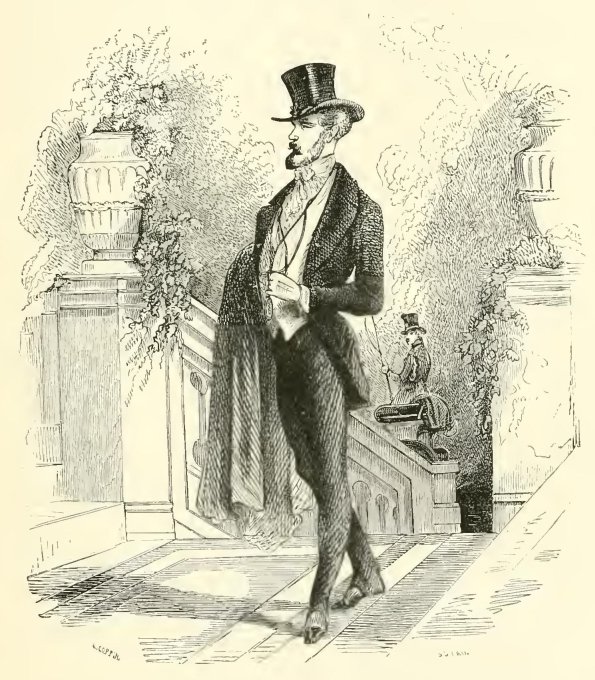

No one could deny that the rooms were splendidly illuminated; the light streamed forth on the gilt mouldings and the silk hangings; and all the bad taste of decorations, which had only their richness to boast of, shone in its splendor. Mademoiselle Eugénie was dressed with elegant simplicity in a figured white silk dress, and a white rose half concealed in her jet black hair was her only ornament, unaccompanied by a single jewel. Her eyes, however, betrayed that perfect confidence which contradicted the girlish simplicity of this modest attire.
Madame Danglars was chatting at a short distance with Debray, Beauchamp, and Château-Renaud. Debray was admitted to the house for this grand ceremony, but on the same plane with everyone else, and without any particular privilege. M. Danglars, surrounded by deputies and men connected with the revenue, was explaining a new theory of taxation which he intended to adopt when the course of events had compelled the government to call him into the ministry. Andrea, on whose arm hung one of the most consummate dandies of the Opera, was explaining to him rather cleverly, since he was obliged to be bold to appear at ease, his future projects, and the new luxuries he meant to introduce to Parisian fashions with his hundred and seventy-five thousand livres per annum.
The crowd moved to and fro in the rooms like an ebb and flow of turquoises, rubies, emeralds, opals, and diamonds. As usual, the oldest women were the most decorated, and the ugliest the most conspicuous. If there was a beautiful lily, or a sweet rose, you had to search for it, concealed in some corner behind a mother with a turban, or an aunt with a bird-of-paradise.
At each moment, in the midst of the crowd, the buzzing, and the laughter, the door-keeper’s voice was heard announcing some name well known in the financial department, respected in the army, or illustrious in the literary world, and which was acknowledged by a slight movement in the different groups. But for one whose privilege it was to agitate that ocean of human waves, how many were received with a look of indifference or a sneer of disdain!
At the moment when the hand of the massive time-piece, representing Endymion asleep, pointed to nine on its golden face, and the hammer, the faithful type of mechanical thought, struck nine times, the name of the Count of Monte Cristo resounded in its turn, and as if by an electric shock all the assembly turned towards the door. The count was dressed in black and with his habitual simplicity; his white waistcoat displayed his expansive noble chest and his black stock was singularly noticeable because of its contrast with the deadly paleness of his face. His only jewellery was a chain, so fine that the slender gold thread was scarcely perceptible on his white waistcoat.
A circle was immediately formed around the door. The count perceived at one glance Madame Danglars at one end of the drawing-room, M. Danglars at the other, and Eugénie in front of him. He first advanced towards the baroness, who was chatting with Madame de Villefort, who had come alone, Valentine being still an invalid; and without turning aside, so clear was the road left for him, he passed from the baroness to Eugénie, whom he complimented in such rapid and measured terms, that the proud artist was quite struck. Near her was Mademoiselle Louise d’Armilly, who thanked the count for the letters of introduction he had so kindly given her for Italy, which she intended immediately to make use of. On leaving these ladies he found himself with Danglars, who had advanced to meet him.
Having accomplished these three social duties, Monte Cristo stopped, looking around him with that expression peculiar to a certain class, which seems to say, “I have done my duty, now let others do theirs.”
Andrea, who was in an adjoining room, had shared in the sensation caused by the arrival of Monte Cristo, and now came forward to pay his respects to the count. He found him completely surrounded; all were eager to speak to him, as is always the case with those whose words are few and weighty. The solicitors arrived at this moment and arranged their scrawled papers on the velvet cloth embroidered with gold which covered the table prepared for the signature; it was a gilt table supported on lions’ claws. One of the notaries sat down, the other remained standing. They were about to proceed to the reading of the contract, which half Paris assembled was to sign. All took their places, or rather the ladies formed a circle, while the gentlemen (more indifferent to the restraints of what Boileau calls the style énergique) commented on the feverish agitation of Andrea, on M. Danglars’ riveted attention, Eugénie’s composure, and the light and sprightly manner in which the baroness treated this important affair.
The contract was read during a profound silence. But as soon as it was finished, the buzz was redoubled through all the drawing-rooms; the brilliant sums, the rolling millions which were to be at the command of the two young people, and which crowned the display of the wedding presents and the young lady’s diamonds, which had been made in a room entirely appropriated for that purpose, had exercised to the full their delusions over the envious assembly.
Mademoiselle Danglars’ charms were heightened in the opinion of the young men, and for the moment seemed to outvie the sun in splendor. As for the ladies, it is needless to say that while they coveted the millions, they thought they did not need them for themselves, as they were beautiful enough without them. Andrea, surrounded by his friends, complimented, flattered, beginning to believe in the reality of his dream, was almost bewildered. The notary solemnly took the pen, flourished it above his head, and said:
“Gentlemen, we are about to sign the contract.”
The baron was to sign first, then the representative of M. Cavalcanti, senior, then the baroness, afterwards the “future couple,” as they are styled in the abominable phraseology of legal documents.
The baron took the pen and signed, then the representative. The baroness approached, leaning on Madame de Villefort’s arm.
“My dear,” said she, as she took the pen, “is it not vexatious? An unexpected incident, in the affair of murder and theft at the Count of Monte Cristo’s, in which he nearly fell a victim, deprives us of the pleasure of seeing M. de Villefort.”
“Indeed?” said M. Danglars, in the same tone in which he would have said, “Oh, well, what do I care?”
“As a matter of fact,” said Monte Cristo, approaching, “I am much afraid that I am the involuntary cause of his absence.”
“What, you, count?” said Madame Danglars, signing; “if you are, take care, for I shall never forgive you.”
Andrea pricked up his ears.
“But it is not my fault, as I shall endeavor to prove.”
Everyone listened eagerly; Monte Cristo who so rarely opened his lips, was about to speak.
“You remember,” said the count, during the most profound silence, “that the unhappy wretch who came to rob me died at my house; the supposition is that he was stabbed by his accomplice, on attempting to leave it.”
“Yes,” said Danglars.
“In order that his wounds might be examined he was undressed, and his clothes were thrown into a corner, where the police picked them up, with the exception of the waistcoat, which they overlooked.”
Andrea turned pale, and drew towards the door; he saw a cloud rising in the horizon, which appeared to forebode a coming storm.
“Well, this waistcoat was discovered today, covered with blood, and with a hole over the heart.” The ladies screamed, and two or three prepared to faint. “It was brought to me. No one could guess what the dirty rag could be; I alone suspected that it was the waistcoat of the murdered man. My valet, in examining this mournful relic, felt a paper in the pocket and drew it out; it was a letter addressed to you, baron.”
“To me?” cried Danglars.
“Yes, indeed, to you; I succeeded in deciphering your name under the blood with which the letter was stained,” replied Monte Cristo, amid the general outburst of amazement.
“But,” asked Madame Danglars, looking at her husband with uneasiness, “how could that prevent M. de Villefort——”
“In this simple way, madame,” replied Monte Cristo; “the waistcoat and the letter were both what is termed circumstantial evidence; I therefore sent them to the king’s attorney. You understand, my dear baron, that legal methods are the safest in criminal cases; it was, perhaps, some plot against you.” Andrea looked steadily at Monte Cristo and disappeared in the second drawing-room.
“Possibly,” said Danglars; “was not this murdered man an old galley-slave?”